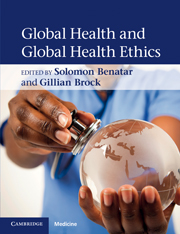Book contents
- Frontmatter
- Contents
- List of contributors
- Introduction
- Section 1 Global health, definitions and descriptions
- Section 2 Global health ethics, responsibilities and justice: some central issues
- Section 3 Analyzing some reasons for poor health
- 12 Trade and health: the ethics of global rights, regulation and redistribution
- 13 Debt, structural adjustment and health
- 14 The international arms trade and global health
- 15 Allocating resources in humanitarian medicine
- 16 International aid and global health
- 17 Climate change and health: risks and inequities
- 18 Animals, the environment and global health
- 19 The global crisis and global health
- Section 4 Shaping the future
- Index
- References
17 - Climate change and health: risks and inequities
Published online by Cambridge University Press: 01 March 2011
- Frontmatter
- Contents
- List of contributors
- Introduction
- Section 1 Global health, definitions and descriptions
- Section 2 Global health ethics, responsibilities and justice: some central issues
- Section 3 Analyzing some reasons for poor health
- 12 Trade and health: the ethics of global rights, regulation and redistribution
- 13 Debt, structural adjustment and health
- 14 The international arms trade and global health
- 15 Allocating resources in humanitarian medicine
- 16 International aid and global health
- 17 Climate change and health: risks and inequities
- 18 Animals, the environment and global health
- 19 The global crisis and global health
- Section 4 Shaping the future
- Index
- References
Summary
Introduction
Human-induced climate change will affect everyone, mostly adversely. It will have greatest, and generally earliest, impact on the poorest and most disadvantaged populations on the planet. The emerging disruption to key life-supporting environmental systems, caused by climate change, has been mostly generated by a small fraction of modern society. It is one of the biggest ethical issues and challenges of our time. Climate change – itself a product of great inter-nation disparities in economic status and power and thus associated with profound global social inequities – looks likely to worsen those inequities. More generally it will likely exacerbate existing health inequities within all countries.
This chapter describes the main dimensions of inequity concerning climate change and health, and the implications for policy. Inequities exist on several main axes. There are the underlying inequities in the negotiated international agreements for schedules of greenhouse gas emissions reduction (e.g. the 1997 Kyoto Protocol and its emerging successor). There are inequities in relation to the health impacts of climate change, both because of the accompanying inversely related history of national emissions and because the absolute increments of disease burdens and premature deaths will directly reflect the pre-existing levels of poor health in climate-vulnerable populations – much of which would by now, in a fairer world, have been reduced (including via the Millennium Development Goals program).
- Type
- Chapter
- Information
- Global Health and Global Health Ethics , pp. 198 - 209Publisher: Cambridge University PressPrint publication year: 2011
References
- 8
- Cited by



